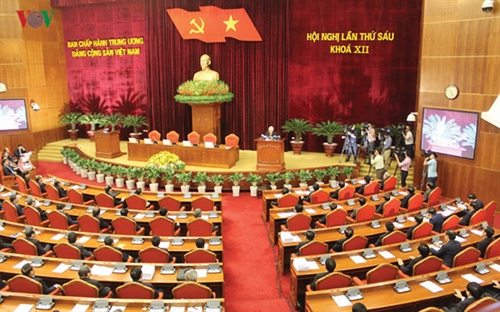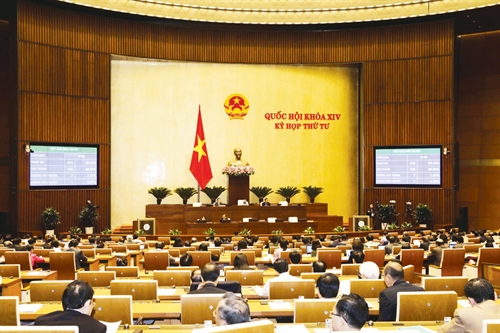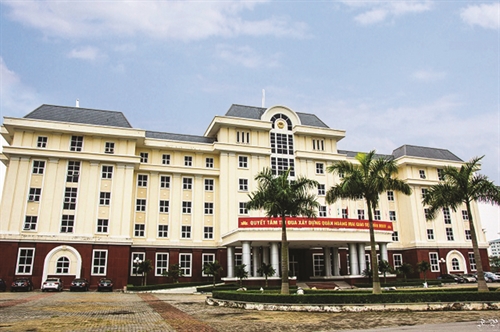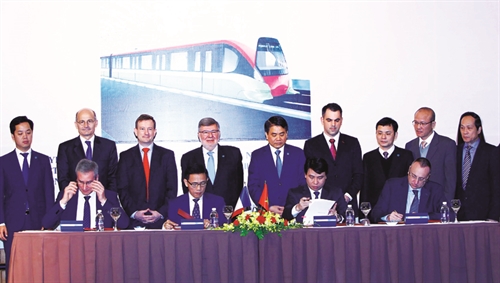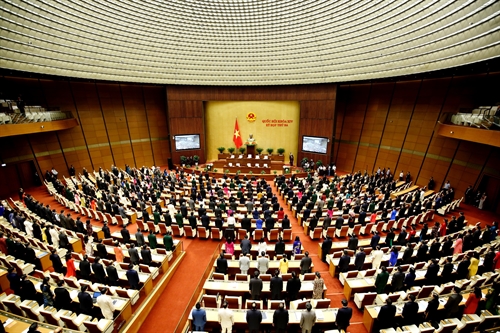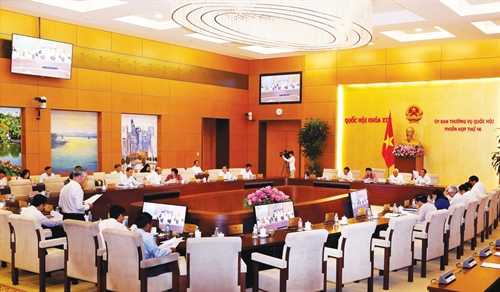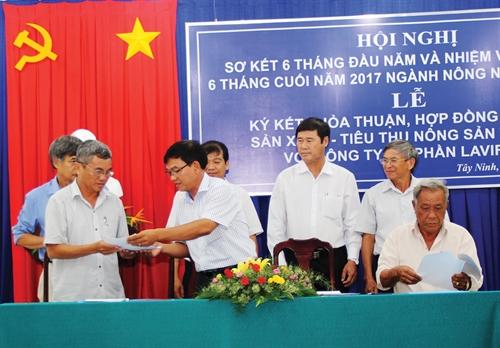Le Vinh Tan
Member of the Party Central Committee
Minister of Home Affairs
Brief introduction on the civil service in Vietnam
Civil service is a power-legal activity carried out by the State’s cadres (can bo) and civil servants (cong chuc). These persons are empowered by the State to perform the functions and duties of the State in the comprehensive management of all aspects of social life. Civil service is to serve the State and the People, and associated with the state power. In general, the regime of civil service and civil servants is a political-legal one largely dominated by politics. Thus, in different countries, the concept of civil service is understood in different ways.
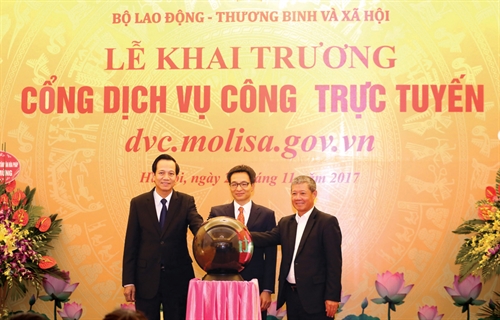 |
Deputy Prime Minister Vu Duc Dam presses the button to inaugurate the public service portal of the Ministry of Labor, War Invalids and Social Affairs on November 23__Photo: Anh Tuan/VNA |
In Vietnam, the civil service, in a broad sense, corresponds to the “political system”, with civil service activities directly carried out by cadres, civil servants and public employees (vien chuc) of the whole system according to their designated functions and tasks. Accordingly, civil service activities embrace activities of the Communist Party of Vietnam, the State, the Vietnam Fatherland Front and socio-political organizations. In a narrow sense, the civil service belongs to the State and is directly performed by cadres and civil servants in state agencies.
Activities carried out by cadres, civil servants and public employees of the state apparatus, political organizations, socio-political organizations and many other social organizations, in essence, all serve public interests. This originates from the nature of the State of the people, by the people, for the people and the common goal of the political system. The 2008 Law on Cadres and Civil Servants stipulates: “The civil service of cadres and civil servants is to perform the tasks and powers of cadres and civil servants prescribed by this Law and other relevant regulations.”
Vietnam’s civil service has a history of over 70 years since the Democratic Republic of Vietnam was founded on September 2, 1945, with the first constitution (1946) of a free and independent country. Under Decree No. 18-SL/1945, on August 18, 1945, the Provisional Government of President Ho Chi Minh converted the mandarinship of the French colonial administrative system into a civil service based on capacity and morality of the Provisional Government. Under Decree No. 76/SL dated May 20, 1950, President Ho Chi Minh issued regulations defining civil servants as “citizens who are assigned specific tasks in the apparatus of the people’s administration” “under the leadership of the Government.” The decree set out the principles governing civil servants, such as recruitment of civil servants based on merits, including qualifications, experience and diplomas, as well as recruitment and placement through examinations, and created a rank-based salary system with rewards granted to excellent performers. However, due to the prolonged war for national independence and unification, the civil service system was regulated by other regulatory documents to meet the requirements and duties of wartime.
In the period of doi moi (renewal), in implementation of the 1992 Constitution, the Standing Committee of the National Assembly promulgated the Ordinance on Cadres and Civil Servants in 1998 stipulating that cadres and civil servants must have good moral qualities, capability, expertise, dedicated service to the people and loyalty to the country. Cadres, civil servants and the organizational apparatus of the civil service are placed under the leadership of the Communist Party of Vietnam and the management of the State.
After amending twice the Ordinance on Cadres and Civil Servants in 2000 and 2003, the National Assembly passed the Law on Cadres and Civil Servants in 2008 and the Law on Public Employees in 2010, clearly defining cadres and civil servants, commune-level cadres and civil servants, and public employees; establishing a civil service system based on working positions and merits in replacement of the career-based civil service system. Accordingly, the civil service system is to develop in the direction of specialization and professionalism, with civil service activities of cadres and civil servants separated from professional activities of public employees.
Civil service reform in Vietnam: results, causes and challenges
The apparatus of state agencies continues to be consolidated toward streamlinedness, effectiveness and efficiency, meeting the requirements of rapid and sustainable development on the basis of the 2013 Constitution. The functions, tasks and organizational structures of state administrative agencies have been adjusted to suit the new conditions. The multi-sectoral and multi-sector management model has proved its suitability in the context of accelerated administrative reform to raise the effectiveness and efficiency of administrative management.
The ministries, ministerial-level agencies and government-attached agencies have strengthened their organizational apparatus toward streamlinedness, effectiveness and efficiency. The functions and tasks of specialized agencies at provincial and district levels have been revised and their organization has been improved, ensuring the unified and smooth management of sectors and fields from the central to local level.
The system of legal documents detailing the provisions of the Law on Cadres and Civil Servants and Law on Public Employees continues to be developed.
The Scheme on promoting the reform of civil service and civil servants aiming to build a professional, responsible, dynamic, transparent and efficient civil service implemented by the Ministry of Home Affairs and other ministries, sectors and localities has achieved initial results. Under this Scheme, the system of institutions for civil servant and public employee management has been improved in accordance with the Law on Cadres and Civil Servants and Law on Public Employees. The structure of civil servants and public employees according to their working positions has been formulated. The system of criteria for civil servant and public employee titles has been built and improved. The methods of evaluating civil servants and public employees have been further renovated.
Payroll has been strictly managed. The objectives, viewpoints and synchronous solutions to reduce staff and restructure the contingent of cadres, civil servants and public employees have been clearly identified.
The civil servant recruitment is further renewed, ensuring openness, transparency and fairness and contributing to the selection of capable and qualified civil servants. Competitive examinations to select leaders and managers have been held on a pilot basis by some ministries, sectors and localities.
The inspection and examination of public duties have been intensified.
The quality of cadres, civil servants and public employees has been increasingly improved in terms of qualifications, competence, professional knowledge and skills, management and administration skills. The appropriate structure of their ranks, gender and age has been ensured.
Administrative rules and discipline are upheld, while professional ethics are promoted. Despite many difficulties in accessing modern and professional management knowledge required in the market economy, their low salaries and incomes, and the negative impacts of the market and the global economic-financial crisis and recession, the majority of cadres, civil servants and public employees still retain the moral qualities and lifestyle, show a sense of responsibility, practice thrift, and are always steady and creative to actively participate in the process of national renewal and reform.
However, there remain some shortcomings in the reform of civil service and civil servants in the past time.
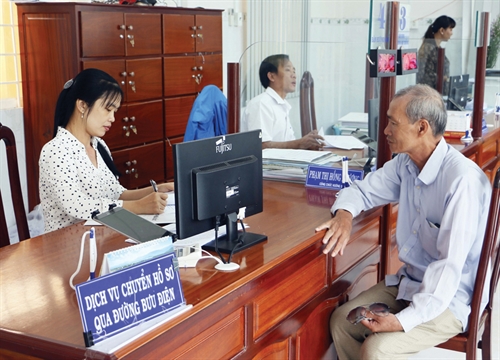 |
A modern single-window division in Vinh Long city, Vinh Long province__Photo: Pham Minh Tuan/VNA |
The administrative apparatus remains cumbersome and inefficient. The staff reduction fails to achieve the set targets and requirements. The quality of cadres and civil servants has been improved but still fails to meet the requirements of development. The structure of civil servants and public employees based on working positions has not been finished. The salary reform is still carried out at a slow pace, failing to make salary truly a motive for cadres and civil servants to perform their tasks.
Some contents of the Scheme on promoting the reform of civil service and civil servants are slow to be implemented, such as the determination of working positions and the structure of civil servants and public employees; the building and finalization of criteria for titles of civil servant ranks and standards of public employee titles; the establishment and operation of the database on cadres and civil servants; the setting up of an information system for management of cadres and civil servants nationwide; the application of information technology to civil servant recruitment and rank promotion examinations; and the adoption of policies to attract, discover, employ and treat talented civil servants.
The objective cause of the above shortcomings is that the process of substantially reforming the state apparatus in line with the process of transforming a centrally planned economy into a market economy is a transition facing many difficulties and challenges, which should be implemented carefully and effectively on the basis of summing up practical lessons and absorbing new values in order to establish models and steps suitable to the country’s characteristics.
The subjective causes include the slow change of perception and the management mechanism, including the delay in the clear separation of the leadership of the Party and the management of the State in tune with the shift to the market economy; the prolonged time of research and experiment; and the slow formulation of new, synchronous civil service institutions to meet the requirements of professionalization and modernization. The establishment of the working position-based civil service already determined in the Law on Cadres and Civil Servants and Law on Public Employees remains too cautious, partly due to the inertness of the old career-based civil service. The method of determining working positions and the process of establishing the working position-based structure of civil servants are somehow confusing and implemented too slowly. The cadre and civil servant management remains scattered among different agencies.
Challenges to the reform of the civil service in the coming time
The perception of a working position-based system in replacement of a career-based one has encountered not a few obstacles due to the subsidized habit. The “payroll” system, which includes payroll management mechanisms and payroll-related policies, has made the “payroll” a target for the majority of workers.
The transformation according to the approach to a talent-based civil service with priority given to genuine capacity is facing challenges posed by the market mechanism affecting the ethics and lifestyle of cadres, civil servants and public employees. Manifestations of pragmatism and insensitiveness tend to spread among a portion of cadres, civil servants and public employees, who have taken advantage of their powers to seek personal benefits, disregarding the collective interests and noble mental values and committing violations of discipline and law.
Salaries and benefits in the public sector are still subsidized, egalitarian, not based on working positions and performance results, thus failing to become a real motive for cadres and civil servants.
Renovation, development and international integration require adequate human resources, with cadres, civil servants and public employees as the core, Therefore, importance should be attached to training aimed to improve quality and build capacity for this force.
Reform of the civil service in the coming period
The 2013 Constitution has affirmed: “The Socialist Republic of Vietnam is the country where the people are the masters; all the state power belongs to the people, which is based on the alliance between the working class and the peasantry and the intelligentsia.” It also stipulates the principle of state power organization: “The state power is unified and is delegated to state agencies which coordinate with and control each other in the exercise of the legislative, executive and judicial power.”
The Political Report of the 11th Party Central Committee at the 12th National Party Congress has identified the task of perfecting the organization and increasing the operational quality and efficiency of the state apparatus. This task is to be performed through:
(i) promoting the implementation of the master program on state administration reforms in the direction of building a democratic, modern, professional and dynamic administration serving the people in an effective and efficient manner;
(ii) improving the democratic and law-ruled administrative institutions, defining the responsibility and accountability of state agencies;
(iii) vigorously removing administrative procedures which cause troubles to the people and businesses;
(iv) enhancing civil service ethics, social responsibility and tightening discipline in civil service direction and performance by cadres and civil servants; and,
(v) accelerating the application of e-government.
The Resolution of the 4th plenum of the 12th Central Party Committee on “Intensifying Party building and rectification; preventing and repelling the degeneration of political thinking, morality and lifestyle as well as “self-evolution” and “self-transformation” manifestations within the organizations” has set the goals to “resolutely overcome the weaknesses in personnel work and personnel management; to build up a contingent of officials and party members, especially leaders and managers at all levels, who have firm political stuff, ethics, responsibility, competence and righteous motives, truly act as pioneers and exemplary models, always put the interests of their collective, country and people above personal interests, are actually cadres of the people, serving the people; and to strengthen the people’s trust in the Party.”
The entire political system, state agencies, the Government, administrative agencies at all levels, cadres and civil servants are of one mind and determined to build a facilitating government which is incorrupt and upright, and acts to serve the people. In the time to come, the reform of civil service and civil servants to meet the requirements of national industrialization and modernization will focus on the following:
Firstly, to continue renovating and perfecting mechanisms and policies. The regulations on functions, tasks, powers, responsibility and accountability should be revised in the direction that state agencies, cadres and civil servants may do only what is permitted by the law; where there is power, there is responsibility. The competence and responsibility of collectives and individuals in each task-performing stage should be clearly identified. The decentralization, delegation and authorization mechanisms should be improved to secure uniform and smooth leadership, management and administration from the central to grassroots level. Sectoral management should be closely combined with territorial management.
Management and administration regulations and working regulations should be revised to ensure synchronism, uniformity, publicity and transparency in and connectivity between the formulation and enforcement of laws, abolishing the “asking-giving” and “approving-granting” mechanism.
It is necessary to further improve civil service and civil servant management regulations, including the Law on Cadres and Civil Servants and Law on Public Employees and guiding documents. Regulations on personnel work should be revised to ensure uniformity, synchronism, tightness of the different stages and transferability between different levels and in the political system. Irrationalities in personnel work, such as those in assignment and decentralization work, management competence, standards, processes... need to be addressed.
Secondly, to further improve the quality of cadres and civil servants. The basic objective of improving the quality of cadres and civil servants is to build a rational structure of cadres and civil servants meeting the practical state administration requirements in terms of professional expertise, ranks, age, gender, region and ethnicity. Cadres and civil servants must meet the following requirements:
• Be loyal to the Party and State of the Socialist Republic of Vietnam;
• Be willing to sacrifice themselves to protect the safety, honor and interests of the country;
• Strictly abide by the Party’s lines and the State’s policies and laws;
• Perform their tasks strictly according to the Party’s regulations and the State’s laws;
• Be dedicated to serve the people;
• Have a sound lifestyle and be honest, thrifty, incorrupt, public-spirited, selfless and impartial;
• Be trained in and equipped with knowledge of political theory, state management, law, foreign language, computer skills and other social knowledge;
• Have sufficient professional skills;
• Have sufficient practical capability in making policies and organizing their implementation according to their responsibilities; and,
• Have good health to perform their tasks, serving the country and people.
In order to improve the quality of cadres and civil servants to meet the above requirements, efforts should be concentrated on performing the following tasks:
- Renewing the recruitment, selection and introduction for election of cadres, transfer, appointment, re-appointment, rotation, change of working positions, resignation, dismissal, reward and disciplining on the basis of specific criteria set for each position and title, strict procedures, clear responsibilities, publicity and transparency. Putting an end to the existing problem of picking positions and titles. Issuing and strictly implementing specific regulations on the number of deputies in the agencies and units. Improving the mechanisms and policies on discovery and use of experts and persons with high qualifications and rich experiences. Attracting talented persons to work in the Party, the State and socio-political organizations at all levels.
- Promoting training and retraining; issuing regulations on compulsory training and retraining in leadership, management and professional knowledge and skills, and encouraging domestic and overseas training.
- Renovating personnel planning and implementing the new five-step process of introduction of candidates in association with setting specific criteria for each position and title. Performing personnel work in a public, transparent, democratic and objective manner. Enhancing the responsibility of Party committees, leaders and advisory bodies in this work. Resolutely screening and dismissing cadres, civil servants and public employees who work ineffectively, fail to fulfill their tasks, are weak in capability, poor in moral quality and low in trust. Expanding the examination-based recruitment of leaders and managers at various levels.
- Renovating the method of organizing civil servant and public employee rank promotion examinations so that they will be serious, transparent, objective and fair; decentralizing or authorizing the organization of these examinations in order to shorten time and save cost.
- Renovating the evaluation of cadres, civil servants, which should be based on the criteria, responsibilities, tasks, powers and performance of each person. Conducting evaluation on the principle of democratic centralism, publicity, transparency... Combining renewal of the content and methods of evaluation with renovation of work planning; regularly reviewing, adjusting and supplementing work plans and performing work according to work plans.
Thirdly, to build and implement the regime of preferential treatment and incentives for cadres and civil servants. It is necessary to continue reforming the salary system and other entitlement policies for cadres and civil servants. This solution will contribute significantly to the apparatus streamlining and staff. Payment of salaries based on performance results and work assessment results should be studied. In the immediate future, policies to give priority to, attract and treat cadres and civil servants engaged in state management should be worked out.
Fourthly, to continue to build morality and improve the quality and responsibility of cadres and civil servants. This solution should be implemented at the same time with implementing the Resolution of the 4th plenum of the 12th Party Central Committee on Party building and rectification. Regulations on responsibility, ethics of civil service, professional ethics, lifestyles and codes of conduct for cadres, civil servants and public employees should be further improved and effectively implemented. A system of behavioral standards in relations between cadres, civil servants and public employees and enterprises and the people should be developed. Discipline in the agencies, organizations and units should be tightened. Bureaucracy, authoritarianism, harassment and negative practices of cadres and civil servants should be addressed. Heads of agencies and units and every civil servant must regularly train themselves and preserve moral qualities and lifestyles, refrain from degeneration, “self-evolution” and “self-transformation.” The Party committees and heads of agencies and units must inspect their cadres, civil servants and public employees.
Fifthly, to improve the effectiveness of inspection, examination and handling of violations committed by cadres and civil servants. The effectiveness of inspection and examination of cadres and civil servants should be raised. The role of inspection and examination agencies should be brought into play. Efforts should be focused on strictly handling acts of corruption, acts of wastefulness, and acts of abusing anti-corruption to slandering and lodging false denunciations. Collectives and individuals who seriously degenerate in political ideology, morality and lifestyles must be promptly and strictly punished.
Lastly, to continue strengthening the cadre and civil servant management apparatus. This apparatus should be organized in line with the professional and modern civil service system. Responsibility, specialization, modernization and transparency should be enhanced to ensure transparent, just and substantive human resource management.- (VLLF)
